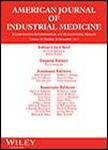版权所有:内蒙古大学图书馆 技术提供:维普资讯• 智图
内蒙古自治区呼和浩特市赛罕区大学西街235号 邮编: 010021

作者机构:Univ Lausanne Inst Work & Hlth CH-1011 Lausanne Switzerland PW Stat Consulting Laxou France Ergon Ch Blonay Switzerland
出 版 物:《AMERICAN JOURNAL OF INDUSTRIAL MEDICINE》 (美国工业医学杂志)
年 卷 期:2011年第54卷第11期
页 面:847-857页
核心收录:
学科分类:12[管理学] 1204[管理学-公共管理] 120402[管理学-社会医学与卫生事业管理(可授管理学、医学学位)] 1004[医学-公共卫生与预防医学(可授医学、理学学位)] 10[医学]
基 金:Agence Nationale de Securite Sanitaire de l'Alimentation de l'Environnement et du Travail France [EST-2007-29]
主 题:ambulance paramedics effort-reward imbalance out-of-hospital care providers multi-level modeling GHQ
摘 要:Background The goal of this paper is to investigate the respective influence of work characteristics, the effort-reward ratio, and overcommitment on the poor mental health of out-of-hospital care providers. Methods 333 out-of-hospital care providers answered a questionnaire that included queries on mental health (GHQ-12), demographics, health-related information and work characteristics, questions from the Effort-Reward Imbalance Questionnaire, and items about overcommitment. A two-level multiple regression was performed between mental health (the dependent variable) and the effort-reward ratio, the overcommitment score, weekly number of interventions, percentage of non-prehospital transport of patients out of total missions, gender, and age. Participants were first-level units, and ambulance services were second-level units. We also shadowed ambulance personnel for a total of 416 hr. Results With cutoff points of 2/3 and 3/4 positive answers on the GHQ-12, the percentages of potential cases with poor mental health were 20% and 15%, respectively. The effort-reward ratio was associated with poor mental health (P 0.001), irrespective of age or gender. Overcommitment was associated with poor mental health;this association was stronger in women (beta = 0.054) than in men (beta = 0.020). The percentage of prehospital missions out of total missions was only associated with poor mental health at the individual level. Conclusions Emergency medical services should pay attention to the way employees perceive their efforts and the rewarding aspects of their work: an imbalance of those aspects is associated with poor mental health. Low perceived esteem appeared particularly associated with poor mental health. This suggests that supervisors of emergency medical services should enhance the value of their employees work. Employees with overcommitment should also receive appropriate consideration. Preventive measures should target individual perceptions of effort and reward in o